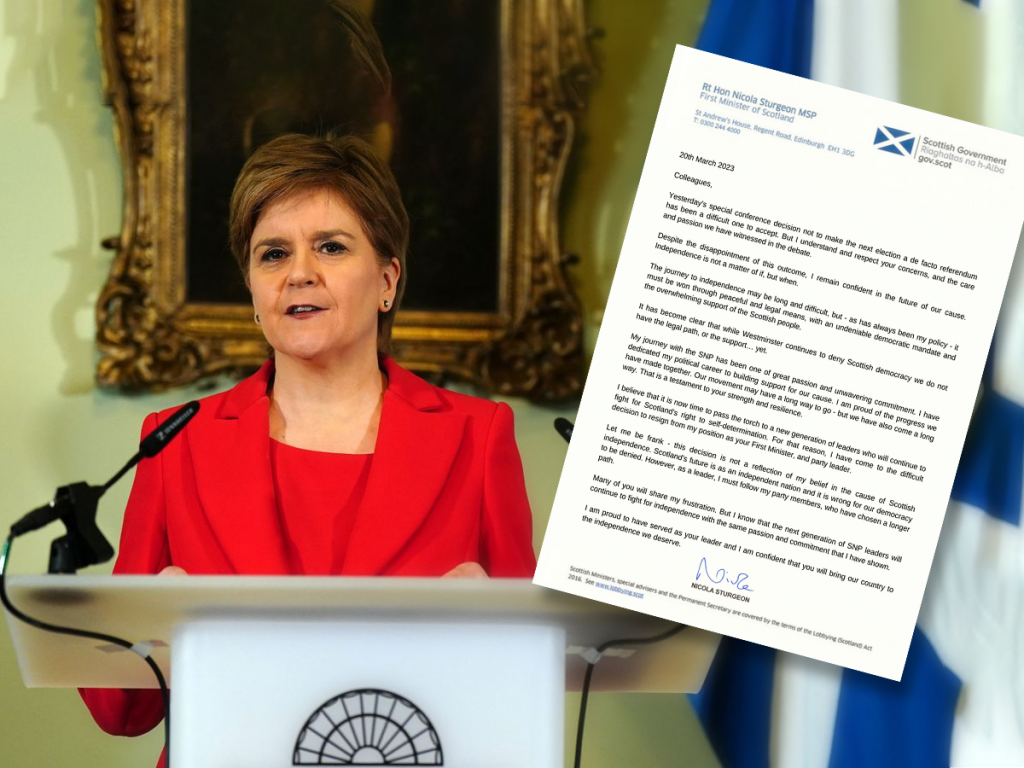Millie Preston takes a look at the recent changes for the Scottish Government following the stepping down of leader Nicola Sturgeon.
In a world characterised by chaos and turmoil, stability is rare and Nicola Sturgeon’s leadership provided many Scottish residents with a firm leader whom they felt they could look towards in times of trouble and angst.
Sturgeon’s resignation as the leader of the Scottish National Party and Scotland’s first minister on 15th February 2023, came therefore as a shock to many, with residents voicing their displeasure. Sturgeon was a symbol of female empowerment as the only woman to ever be First Minister of Scotland; Glasgow resident and former Labour councillor, Anne Marie Miller, commented on her “open” character, the more “human” element to her politics and how it was a “shock” to hear that Scotland’s longest serving and only female first minister had resigned.
Her reign as leader of the SNP and First Minister for Scotland was not completely unproblematic for Sturgeon and she notably has left many countrywide issues for her successor to deal with. These include, amongst others: the A&E department crises with long hospital waiting lists and understaffing, the underfunding of local governments, the increasing pressure to veto the plan for a centralised national care system and the unpopular plan to introduce the UK’s first deposit return scheme for cans and bottles. She has, further to this, resigned at a time when gender politics a decisive topic amongst those in power and changes to Scotland’s gender recognition laws are in the process of being decided upon.
Sturgeon’s leadership was, however, very impressive in its’ length and her tenure as leader of the Scottish National Party included leading Scotland through an national pandemic. During her speech of resignation, she referred to the COVID pandemic of 2020 as “by far the toughest thing [I’ve] done and it may well be the toughest thing I will ever do.” Her tenure also saw her championing many defining policies for Holyrood and the SNP – she introduced free pre-school hours, as well as free school meals and a £20 weekly welfare payment; she widened access to universities, and she also shifted the burden of Scotland’s taxes to the wealthiest members of society.
So what does her resignation mean for Scottish politics? Without Sturgeon as the face of independence for Scotland, the strive for the country to be independent to the United Kingdom may wean. Many had confidence in her as a leader and her unwavering support for independence led many to support her cause. Without her, the SNP will be less recognisable and the support may dwindle as a result. Many senior SNP leaders also believe that Sturgeon’s resignation will stall their effort to hold another independence referendum by at least another five years.
Sturgeon’s support for the LGBTQ+ community was quiet yet appreciated. However, with Sturgeon gone and the UK Conservative party expected to fight for victory in the culture war territory, many are concerned with where that leaves the rights of more marginalised groups. Sturgeon’s ambition to improve the lives of marginalised groups was clear in many of the equalities improvements which she made – the buffer zones introduced at abortion clinics and the categorising of misogyny as a hate crime are good examples.
Nicola Sturgeon’s absence will be felt by many and although opinions may be divided on her and her politics – the impact that she’s had on Scottish politics has certainly been long-standing.
Edited by: Zoe Powell (News and Politics Editor)
Deigned by: Sarim Mangi (Head of Design)


